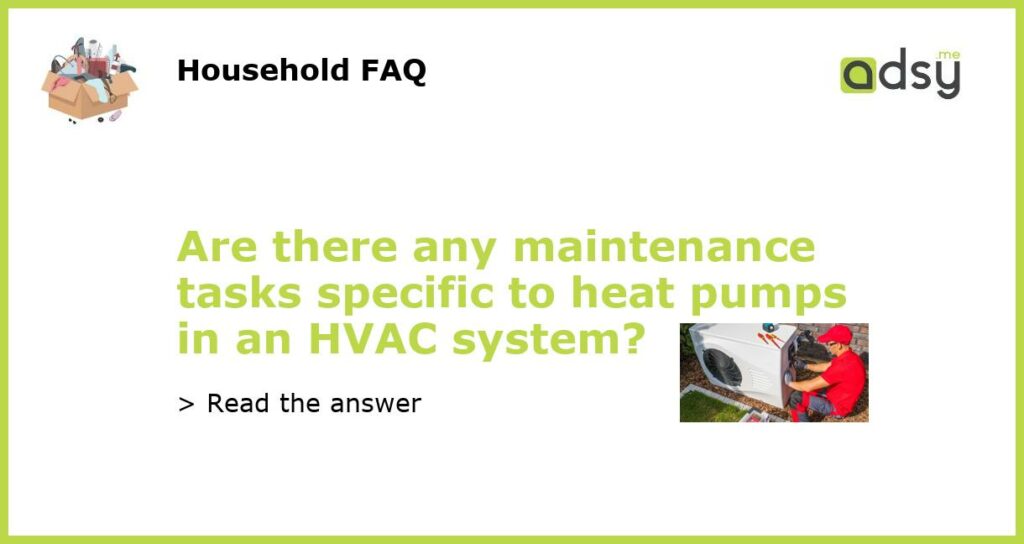5 Maintenance Tasks Specific to Heat Pumps in an HVAC System
Heat pumps are an essential part of many HVAC systems, providing both heating and cooling capabilities. Like any other component of an HVAC system, heat pumps require regular maintenance to ensure optimal performance and longevity. However, there are certain maintenance tasks specific to heat pumps that you should be aware of. In this article, we will discuss five essential maintenance tasks for heat pumps in an HVAC system.
Cleaning the Outdoor Unit
The outdoor unit of a heat pump is exposed to various outdoor elements such as dust, dirt, leaves, and debris. Over time, these particles can accumulate on the unit’s coils, reducing its efficiency and productivity. It is important to regularly clean the outdoor unit to keep it running smoothly.
Start by turning off the power supply to the heat pump. Then, remove any debris or vegetation around the unit. Gently clean the coils using a soft brush or a low-pressure water hose. Avoid using high-pressure water, as it can cause damage to the coils. After cleaning, allow the unit to dry completely before turning the power back on.
Checking and Replacing Air Filters
Just like any HVAC system, heat pumps have air filters that need to be checked and replaced regularly. Air filters prevent dust, allergens, and other particles from entering your home, improving indoor air quality. Clogged air filters can restrict airflow, reducing the system’s efficiency and increasing energy consumption.
Check your heat pump’s air filter every month and replace it if it appears dirty or clogged. In general, it is recommended to change air filters every 60-90 days. However, if you have pets or suffer from allergies, more frequent filter changes may be necessary.
Inspecting and Cleaning the Coils
The coils of a heat pump play a crucial role in transferring heat between the indoor and outdoor units. Over time, dirt and debris can accumulate on the coils, inhibiting proper heat transfer and reducing efficiency. Therefore, regular inspection and cleaning of the coils are necessary.
Inspect the coils visually for any signs of dirt or debris. If you notice a buildup, use a soft brush or a coil cleaning solution to gently remove it. Be careful not to damage the delicate fins on the coils. Regular coil cleaning helps ensure optimal heat transfer and prevents unnecessary strain on the system.
Checking Refrigerant Levels
Refrigerant is essential for the heat transfer process in a heat pump. Low refrigerant levels can cause the system to operate inefficiently and may lead to serious damage to the compressor. It is important to check the refrigerant levels regularly and top up if necessary.
Refrigerant levels can only be accurately measured by a qualified HVAC technician. If you suspect low refrigerant levels or notice any signs of a refrigerant leak, such as reduced cooling or heating performance, contact a professional to inspect and service your heat pump.
Testing the Defrost Cycle
During colder months, heat pumps switch into a defrost mode to remove frost and ice buildup on the outdoor unit. A malfunctioning defrost cycle can reduce the system’s efficiency and overall performance. It is crucial to regularly test the defrost cycle of your heat pump to ensure it is working correctly.
Start by monitoring your heat pump during cold weather conditions. Observe if the unit goes into defrost mode as expected and if it defrosts ice buildup efficiently. If you notice any issues, such as prolonged defrost cycles or inadequate defrosting, contact a professional HVAC technician to diagnose and repair the problem.
In conclusion, heat pumps in an HVAC system require specific maintenance tasks to ensure optimal performance and longevity. By regularly cleaning the outdoor unit, checking and replacing air filters, inspecting and cleaning the coils, checking refrigerant levels, and testing the defrost cycle, you can keep your heat pump running smoothly and efficiently for years to come.

